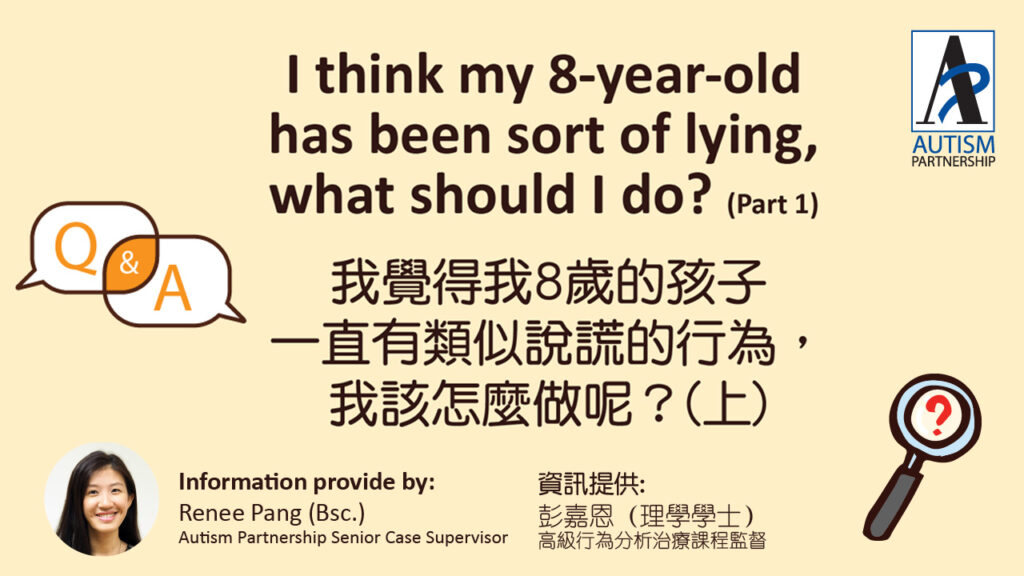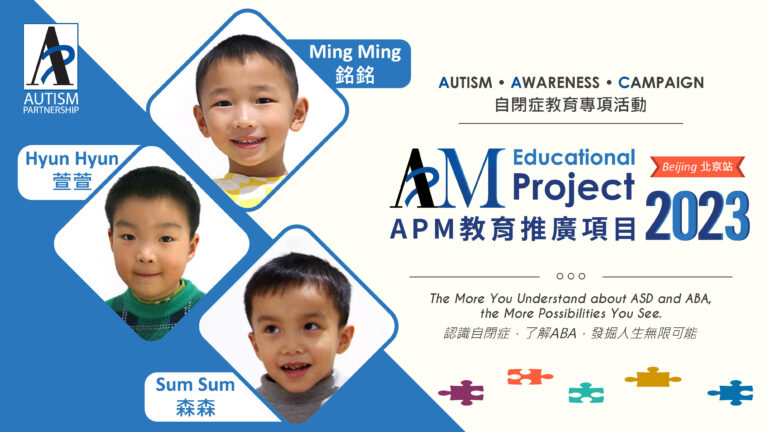
Parent’s Question:
My child is now eight years old and studying in Primary 2 in a mainstream school. He can speak, but his social skills and comprehension skills are not very good. I think he’s been sort of lying. For example, he had a PE class in school, but when I ask him if he has had a PE class, he would say no and make up a lot of reasons. Another example is that when I ask him what did he have for lunch at school, he would answer, but none of those food was on the menu.
What should I do?
Autism spectrum disorder (ASD) is a neurodevelopmental condition that causes challenges in an individual’s social communication skills, social interactions and behaviours. Individuals with ASD can also present difficulties with understanding or using spoken language.
It is not uncommon for these challenges to be misunderstood by others. For example, a child who does not understand a question and lacks the ability to ask for help may appear to his/her teacher as not paying attention or perhaps, a deliberate act of defiance. In another (this) situation, when a child is not able to give accurate, or complete, account of his day when asked, he could be easily thought as lying.
However, before we discuss the child’s behaviour (in this case, lying), let’s explore some of the language and cognitive skills needed for the child to recall and answer the questions around his day from his parents.
The ability to understand different types and complexity of instructions helps to build the skill to differentiate different questions. At a beginner’s level, this could be basic instructions such “Pack your bag”. Advance instructions can consist of multiple parts or with different language concepts that include verbs, locations, adjectives, quantities, etc.
| Type of Instruction | Examples |
| Basic Instruction | “Pack your bag.” |
| Instruction with Multiple Parts | “Pack your snack box into your bag.” |
| Instructions with Different Language Concepts | “Pack your red snack box into your bag.” |

These WH questions includes who, what it is, what’s happening, where, why and how. Besides having the ability to discriminate these questions, it is essential for your child to have the ability to answer these questions from a more structured setting (eg. A book, a picture card) to a more natural environment.

The ability to sequence events allow your child to also understand temporal concepts of what comes before and after. This can involve basic sequencing (eg. the ability to understand what comes next) to more advance ability to sequence events that happened earlier.

Having the skill to describe with details allow your child to express what he experienced. This would include other language skills such as the ability to recall, sequencing of events and able to express advance language concepts such as verbs, locations, adjectives, quantities, etc.

Recalling events works on your child’s memory and require your child to remember what happened earlier. In a more advance situation, we may require the child to describe a sequence of event.

Besides the ability to distinguish different events apart, this cognitive skill would also give rise to the ability to understand and respond to a question that involves a specific time and sequencing of events.

The ability for your child to recall what happened to them in the day, and answer questions relating to the events require multiple skills. This can range from basic comprehension to more complex skills that involve cognitive and reasoning skills. When a child acquires strong language skills, it gives the him/her the ability to understand the question, communicate more accurately, and reduces being misunderstood.
In Part 2, I will discuss with you some of the ways we can support children to respond truthfully, or accurately, to us.
Renee Pang holds a Master of Education in Applied Behaviour Analysis from Monash University, Australia. She joined Autism Partnership, Singapore, in 2010 and worked with children on both one-on-one and group settings and provided shadow-aide support in mainstream schools. In 2013, Renee became a Program Supervisor where she worked on designing and tailoring curriculum for the child’s needs under the supervision of the consultants. Additionally, she also ran social groups in mainstream schools and collaborated with teachers and principals to devise integration plans. Renee also provides staff and parent training sessions locally and overseas. She is also fluent in English, Mandarin and Cantonese. Since 2019, Renee currently works with Autism Partnership, Hong Kong, to provide consultation, parent training, and staff training for clients in Shanghai.

Every little life is a special present for a family. From the time a baby is born, parents journey through lots of highs and lows, wishing for their child to grow up with a big smile, make great friends, find their own way in a job they love, and create a happy family. However, for […]

Autism Spectrum disorder can be diagnosed as early as 18 months. Research shows strong evidence on how effective Applied Behavior Analysis (ABA) can help children with Autism. It helps to deal with children’s challenging behaviors such as inattention, aggression, self-stimulation, etc. Howard, et al (2005) conducted a study to compare the effectiveness of 3 treatment […]

In today’s society where information flows freely, parents can easily receive different messages. However, these messages are often debatable or even wrong. Believing wrong information can easily lead to misguided choices and delay treatment, the consequences of which may last a lifetime. When conducting one-on-one consultations with parents, I often hear the following misguided views […]
Please share to let more people learn about ASD and ABA therapy:
AP holds the belief that with quality Autism Partnership Method (APM) treatment, individuals with autism should reach their fullest potential and achieve the greatest degree of independence and highest quality of life possible.

Sign up now to get ABA and Autism related news delivered to your inbox. Enter your email to get started
Hong Kong Center
Kowloon Center

All information received will always remain confidential. We will contact you as soon as we review your message. Thanks